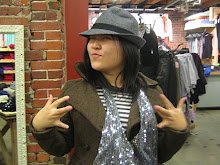It's been a really beautiful couple of days, as the weather in the tri-state area finally hit 60s and up. I love this time of the year, as the days get longer and the warm weather rolls in, you can feel life on every corner. The trees are in full bloom, people are everywhere, the scent of nature hangs in the air. As I was enjoying this nice change of pace I couldn't help but reflect on the events that happened one week ago today. It just seemed especially sad to me that there are people who have been stripped of their lives and their bright futures in a senseless act that has rocked the nation forever. The 32 victims of the Virginia Tech shootings will never see another season change, never feel the warm sun on their faces, never realize the potential that was ahead of them.
For me (and probably for most Korean-Americans/Asians), the case especially hits home. It was inevitable that as soon as the killer was revealed to be Korean, the media would be all over the race card. And of course, the backlash began, with Koreans/Asians fearing for their safety and everyone publicly decrying the acts of Seung-Hui Cho. I understand, and have felt, the anger and confusion and even embarrassment over the fact that something as horrible as this, the worst campus shooting in US history to be exact, was committed by someone who looks like us. But the thing is, as long as this mass murderer wasn't white, there was no way anyone would have escaped the intense scrutiny of racial background in conjunction with the person himself. But what makes me angry about the entire thing is how very few seem to acknowledge just how American Cho was despite not being a full-on citizen. This is a prime example of nature vs. nurture, and how a lonely, withdrawn, unstable person was driven to commit the most unspeakable act as a result of an uncaring and judgmental society and as a result of a lack of resources to help deal with issues regarding mental health.
If this sounds like I'm defending Cho and his heinous actions, I'm not. He ruthlessly shot down 32 people in an act that he had been planning for months. He compared himself to a martyr and likened himself to Jesus Christ. He will be punished for what he did. But there is also no clear-cut villain here. Cho was the product of a society that rejected him and the people who ignored him and cast him off as weird. He grew up in a country where it is ridiculously easy to get a hold of guns, citizen or not, mentally stable or not. It's so easy to just write him off as a person who went mental and planned a massacre, but it's not as easy to see the deep seeded issues that allowed Cho to do what he did.
Of course gun control is a foremost issue here. We need stricter laws, but the only real way to drastically lower the number of people dying in gun violence is to get rid of them, period. That's easier said than done, but it can be done, just ask Britain and Canada, countries that have seen gun violence significantly drop by banning them. But the issue that is most pressing is the one of mental health. Cho was a deeply troubled person and there were warning signs everywhere. There's no use in anyone feeling guilt over what he did because there's no way of turning back time. But things have got to change to ensure more resources on college campuses for people to feel safe. We have to get rid of the still exisiting taboo against mental illness, which is very real and very prevalent in many people's lives. This especially holds true for Asians and Koreans in general, where issues of mental health is still something that is considered taboo. If there is anything us Koreans and us Americans learn from this tragedy, it is to open up a dialogue about how real and gripping mental illness is, and brainstrom and implement things we can do as communities to help those who suffer. It's so easy to write off outcasts as weirdos or whatever, but things are never going to change if we keep not caring. The system failed Cho repeatedly. He was able to squeak on by with minimal tarnish on his official records despite trips to mental hospitals and appearances in courts. It shouldn't have happened, but it did. We have to fix it. We owe that much to the people who have paid with their lives.
Subscribe to:
Post Comments (Atom)

1 comment:
jen! i totally wrote a paper on this for my american studies 101 final paper. i miss you!
Post a Comment